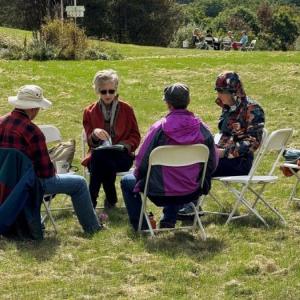On land and at sea, Maine’s chaplains tackle climate anxiety
As a maritime chaplain with Seafarer’s Friend, a 200-year-old New England organization, Thomas Kircher boarded vessels from Portsmouth to Searsport.
Many of the men he met onboard came from other countries on three- to nine-month stints. Kircher offered a quiet ear, listening to their struggles with isolation, as well as practical support, helping them send money home to their loved ones.
In every conversation, Kircher had a go-to question: How’s the weather been out at sea?
Research shows that climate change has led to more frequent marine heatwaves and more intense storms, among other changes, according to NASA. The seafarers Kircher worked with had more immediate concerns than a warming planet, he said, but they all had stories of bigger waves and stronger winds.
This summer, Kircher retired from Seafarer’s Friend to focus more on climate advocacy within faith communities, joining other faith leaders in Maine who are putting more emphasis on addressing people’s spiritual needs in the face of a warming planet.
According to a 2022 survey by the Yale Program on Climate Change Communication, one in 10 Americans reported experiencing consistent symptoms of anxiety because of climate change, with almost as many reporting symptoms of depression. A quarter of respondents, meanwhile, said they try not to think about climate change at all.
“Regardless of whether society chooses to address them or not, the impacts are going to be felt,” Kircher said. “So as somebody who’s interested in the wellbeing of the world around me, as a chaplain, I think it’s vitally important that faith leaders learn how to start the conversations and deal with the emotional responses, whether they’re anger or grief or fear.”
Chaplains’ changing roles
The use of chaplains in the American military predates the Declaration of Independence. Initially tasked with tending to soldiers’ spiritual needs from a Christian perspective, the work of chaplains has broadened to include hospitals, universities, hospice care and more.
As the U.S. has become more diverse, so, too, have its chaplains. The Association of Professional Chaplains, which provides board certification for chaplains nationally, lists 29 core competencies that chaplains must adhere to, including providing religious or spiritual resources appropriate to their care recipients’ own spiritualities and goals. Non-religious chaplains are a growing group in the profession, according to the Religion News Service.
Their areas of focus have also broadened, from movement chaplains supporting protesters to Red Cross chaplains deployed with disaster response teams. In 2005, Sarah Vekasi coined the term eco-chaplaincy, referring to an emerging group of chaplains who focus on how climate change impacts people’s spiritual needs.
The Portland-based Chaplaincy Institute of Maine has ordained more than 220 interfaith ministers since its founding in 2002. The Rev. Lisa Steele-Maley, the institute’s executive director, said those who go through the two-year program may seek board certification afterwards, but many opt instead to incorporate what they learned into other jobs or provide part-time spiritual services in a variety of contexts.
The institute doesn’t focus on political issues, but Steele-Maley said students bring their own experiences in the world into discussions. During the January wildfires in Los Angeles, for example, conversation turned to the impact of climate change on natural disasters.
Chaplains are uniquely positioned to serve people’s spiritual needs regardless of faith backgrounds, Steele-Maley said. Several of the institute’s alumni, including Kircher, have gone on to focus in part or in whole on the relationship between spirituality and environmental issues.
For Circe Moss MacDonald, an eco-chaplain and spiritual leader at the Portland New Church Center for the Sacred Arts, climate grief is a central aspect of her monthly cosmic mass. The ceremony, which typically attracts around 30 people, centers on people’s connection to the Earth.
One stage of the ceremony is centered on grief, which helps people understand their relationship to the environment, MacDonald said. Her practice has attracted many people who identify as spiritual but not religious, and she focuses on making a space where people concerned about climate change can process their emotions in a spiritual context, even if they wouldn’t otherwise be comfortable talking in terms of faith and religion.
Through yoga, songs and testimonies, the process helps people “express grief over climate change, climate catastrophes, changes in their environment,” MacDonald said, noting that this is “ key in helping people become less numb and disconnected and walking around thinking that they’re somehow not part of everything, not part of nature.”
The Rev. Gabe Burford, a graduate of the chaplaincy institute who works as a community and climate chaplain in Belfast, tends to the spiritual needs of activists and protesters. He hosts a monthly potluck for climate organizers, as well as several online meditation groups, and speaks at events focused on climate advocacy.
“Once there’s a level of trust built … we can talk about how fatalism is actually the least beneficial mindset that we can use to approach anything, but particularly these big, big challenges like climate change,” Burford said. “Then we start to focus on, ‘Where is our agency and how can it unfold into the world?’”
‘A climate-changed world’
Environmental lawyer Gus Speth once said, “I used to think the top environmental problems were biodiversity loss, ecosystem collapse and climate change, but I was wrong. The top environmental problems are selfishness, greed and apathy.”
For spiritual leaders like the Rev. Allen Ewing-Merrill, executive director of the BTS Center in Portland, the quote has been a call to action.
“Science does not have any opinion on selfishness, greed or apathy,” Ewing-Merrill said. “Those are not within the purview of the science community, but they ought to be in the purview of the spiritual community.”
Ewing-Merrill was hired as executive director in 2019. The center, originally Bangor Theological Seminary, stopped operating as a seminary in 2013, and its board of directors spent the next six years looking for a new direction. A month after he was hired, Ewing-Merrill had an epiphany. While pursuing a doctoral degree, one of Ewing-Merrill’s professors began a lecture talking about what global climate devastation would mean for the planet.
“And I just knew with a greater clarity than I have ever experienced that this is what the BTS Center needed to turn its attention to,” Ewing-Merrill recalled.
He went into his first official meeting with the board of directors and pitched his idea: a hard focus on environmental issues. Six years later, the BTS Center is carrying out this mission under the slogan, “Spiritual leadership for a climate-changed world.”
The Rev. Alison Cornish began working with the BTS Center in 2021. Two years later, she helped spearhead the center’s climate conscious chaplaincy program, in partnership with the national Chaplaincy Innovation Lab.
Cornish sees the program as offering a new lens for spiritual leaders in a variety of fields. University chaplains might work with students who feel a sense of doom about their future because of potential climate catastrophes, while hospital chaplains need to be aware of how the impacts of climate change could lead to more patients needing care.
“We’re working with faith leaders in lots of different roles — preachers and pastors and spiritual directors, chaplains, et cetera,” Cornish said. “Really the questions that we’re asking are: ‘How are you as a faith leader needing to do your work or are called to do your work differently because you live in a climate-changed world?’”
This story was originally published by The Maine Monitor, a nonprofit civic news organization. To get regular coverage from The Monitor, sign up for a free Monitor newsletter here.



























